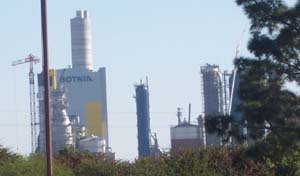 |
Pulp
mills in Uruguay |
|
For some months now, declarations have been circulating
in Southern Brazil and in Uruguay, both by members of the Swedish-Finnish
company Stora Enso and by Government authorities of these countries
regarding the advantages for the local population of the installation
of the company’s pulp mills in the region.
The president for Latin America of Stora Enso, Nils Grafström,
as well as other high-ranking executives of the Swedish-Finnish company
visit towns in both countries with the sole aim of announcing wealth,
development and environmental preservation. Something very similar is
taking place at this same time in other Latin American, African and
Asian countries, such as China, where Swedish and Finnish corporate
representatives increasingly affirm the social, economic and environmental
benefits of projects to install thousands of hectares of plantations
and new pulp mills.
However, the facts show that once installed in the countries
of the South, the situation is really very different from what the companies
had promised.
The experience of the Veracel pulp mill - joint property
of Stora Enso and Aracruz and operated by the former – in the Brazilian
State of Bahia is a clear example of unsustainablility. This is confirmed
in a letter we received, signed by an important group of “men, women
and young people, rural and urban workers, indigenous people, environmentalists,
scientists, professors, students, in which they denounce the situation
of degradation and poverty of the Southern Region of the State of Bahia,
promoted by the pulp company Veracel, a joint venture of Stora Enso”.
This situation is the result of the negative social and
environmental impacts caused both by the vast monoculture tree plantations
that the company has been establishing in the region for many years
now to make available the necessary raw material, and by the pulp mill
itself that started operating in 2005, with an annual production of
900,000 tons of pulp for export.
This letter states that “Over the past years, Veracel
has generated a track record of environmental degradation, concentration
of land, eviction of thousands of workers from the rural areas to the
outskirts of cities, causing significant social and environmental disruptions”.
Regarding the generation of jobs, the letter affirms
that “Not satisfied with the large number of lands purchased in the
Southern Region of Bahia for the plantation of eucalyptus, Veracel Celulose
now moves forward to the south of the State ignoring the social impacts
this entails. Only in the municipality of Mascote, the company
purchased several estates. Approximately, 400 workers lost their
employment. Many of these workers moved to the outskirts of nearby
cities”.
As is also happening in the case in Uruguay and many
other countries, the signatories of the letter complain that: “In one
of the properties of the Santa Rita group (made up by 4 ranches) purchased
by Veracel … the houses, corrals and plantations have already been destroyed
to eliminate the signs that human beings once lived there, who depended
on that land”.
Additionally and as is already happening in other regions,
the plantations have negative impacts on water and in this respect,
the letter states that: “Throughout the region,
the extensive plantation of eucalyptus has resulted in the disappearance
of several rivers and streams”.
When Stora Enso was installed in Bahía, it did so on
the basis of the same promises of employment, development and wealth
that it is now making in other countries. For instance, according to
the Uruguayan press, “the information handled so far by Stora Enso”
is that during its operational phase it will generate “some 3,000 direct
and indirect jobs.” In Bahia not only did those
promises prove to be false, but the company also generated rural migration,
unemployment and poverty.
We ask ourselves how long these companies will be able
to continue repeating their lies with impunity.
The letter referred to in this article is available at: http://www.wrm.org.uy/countries/Brazil/LetterStoraEnso.html |
Inicio
/ Monte Indígena
/ Plantaciones
Forestales / Fábricas
de Celulosa
Grupo Guayubira
Maldonado 1858 - Montevideo - Uruguay
tel: (+598) 2413 2989 / fax: (+598) 2410 0985
info@guayubira.org.uy